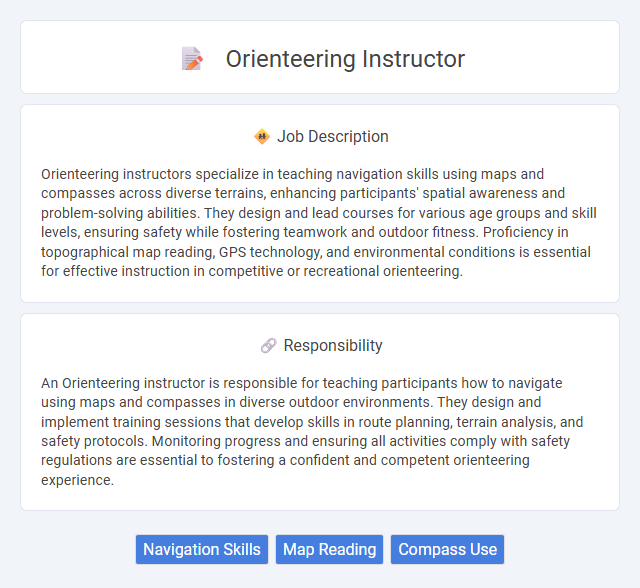
Orienteering instructors specialize in teaching navigation skills using maps and compasses across diverse terrains, enhancing participants' spatial awareness and problem-solving abilities. They design and lead courses for various age groups and skill levels, ensuring safety while fostering teamwork and outdoor fitness. Proficiency in topographical map reading, GPS technology, and environmental conditions is essential for effective instruction in competitive or recreational orienteering.
Individuals with strong physical fitness and a passion for outdoor activities will likely be well-suited for an orienteering instructor role. Those who enjoy teaching, have good navigation skills, and can remain calm under pressure probably have a higher probability of success in this job. Conversely, people with limited endurance or discomfort in unpredictable environments may find this profession challenging.
Qualification
An Orienteering instructor requires strong skills in map reading, compass navigation, and terrain analysis to effectively teach participants of all ages. Certification from recognized organizations such as the Orienteering USA Level 1 or 2 coaching programs enhances credibility and ensures adherence to safety standards. Practical experience in diverse outdoor environments, combined with first aid training, is essential for managing courses and emergencies during instructional sessions.
Responsibility
An Orienteering instructor is responsible for teaching participants how to navigate using maps and compasses in diverse outdoor environments. They design and implement training sessions that develop skills in route planning, terrain analysis, and safety protocols. Monitoring progress and ensuring all activities comply with safety regulations are essential to fostering a confident and competent orienteering experience.
Benefit
An orienteering instructor job likely offers the benefit of developing strong leadership and navigation skills while promoting physical fitness and outdoor education. There is a high probability that instructors gain valuable experience in teamwork facilitation and problem-solving under pressure. This role could also provide opportunities for personal growth, career advancement, and engagement with diverse groups in dynamic natural settings.
Challenge
An orienteering instructor role likely involves guiding participants through complex navigation challenges in diverse outdoor terrains, requiring strong problem-solving skills and physical endurance. The position probably demands quick thinking and adaptability to help learners improve their map-reading and compass-use abilities under varying conditions. Mastery in creating engaging, yet demanding courses could be essential for effectively fostering participants' confidence and navigational competence.
Career Advancement
Orienteering instructors develop advanced skills in navigation, map reading, and outdoor leadership, positioning themselves for roles such as expedition leaders, outdoor education coordinators, or wilderness guides. Gaining certifications in advanced first aid, survival techniques, and instructional methodologies enhances career prospects and opens opportunities in adventure tourism and environmental education sectors. Consistent experience in training diverse groups and organizing competitive events contributes to professional growth and recognition within outdoor adventure industries.
Key Terms
Navigation Skills
Orienteering instructors develop expert navigation skills, teaching participants how to interpret topographic maps and use compasses effectively in diverse terrains. They emphasize spatial awareness, route planning, and decision-making under pressure, critical for successful navigation during orienteering events. Mastery of these techniques improves safety and performance, making navigation skills essential for both beginners and advanced orienteers.
Map Reading
Orienteering instructors specialize in teaching advanced map reading skills, including interpreting topographic features, understanding contour lines, and using compass bearings effectively. They train participants to analyze terrain, navigate varied landscapes, and make real-time decisions based on map details. Mastery in orienteering map symbols and scale interpretation is essential for guiding learners through successful navigation challenges.
Compass Use
An Orienteering instructor specializes in teaching compass use, emphasizing accurate map reading, bearing determination, and terrain navigation skills. Mastery of compass techniques is essential for guiding participants safely through various outdoor courses and enhancing spatial awareness. Expertise in declination adjustments and pacing methods ensures precise route planning and efficient decision-making during orienteering activities.
 kuljobs.com
kuljobs.com